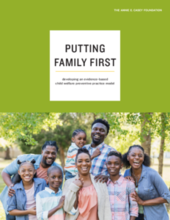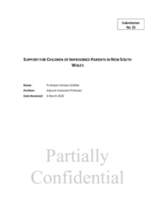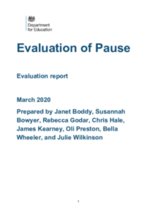Displaying 121 - 130 of 911
This paper provides insights into the feasibility and lessons learned from rural Kenya in providing Care for Child Development (CCD) training and supporting its implementation alongside the Baby Friendly Community Initiative (BFCI).
This paper from the Annie E. Casey Foundation provides guidance for state child welfare agencies on what to consider when developing a preventive practice model that aligns with the requirements of Family First, addresses the unique needs of families within local communities and ensures that selected programs and practices are feasible to implement with quality.
In this chapter, the authors describe the scale-up and impact of a linked multilevel intervention in a public child welfare system.
The purpose of this study was to conduct a systematic review and meta-analysis on the effectiveness of parenting interventions in preventing violence against children.
In this Submission to the Inquiry into Support for Children of Imprisoned Parents, Karleen Gribble, Adjunct Associate Professor in the School of Nursing and Midwifery at Western Sydney University, comments on "the situation of infants and young children whose mothers are incarcerated and the support or undermining of their health and wellbeing in the justice system."
The primary aim of this chapter is to outline the significance of trauma in the lives of parents involved in the child protection system who are sent for forensic psychological evaluations.
This independent evaluation found that the Pause Programme - which supports local practices to deliver relationship-based support to women who have experienced removal of at least one child and are judged to be at risk of further removals of children - is effective in making a positive difference in women’s lives, improving their relationships with children, reducing rates of infant care entry in local areas and delivering cost savings for local areas.
The aims of this article were to identify the types and characteristics of social support for families in vulnerable situations and to analyze what elements influence families’ attitudes towards these supports.
This study describes the community-based needs of parents with psychiatric disabilities who experienced legal challenges to their parenting rights.
There is limited understanding related to the role of community‐based centres in reducing social exclusion and isolation, so the aim of this research was to explore the role one family centre had in improving social inclusion in a deprived community in Glasgow, Scotland.




